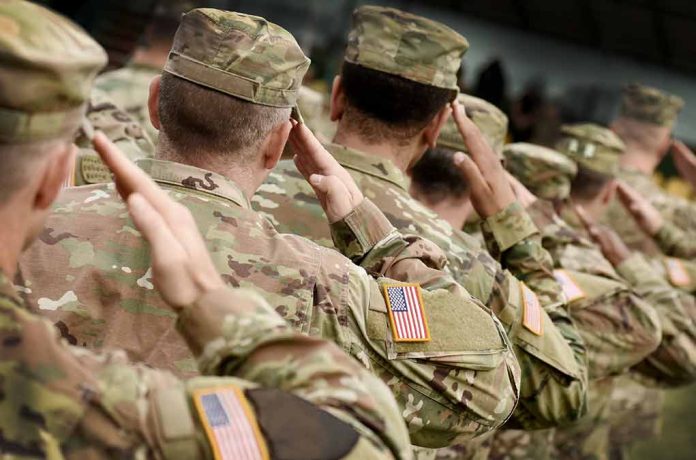
President Trump’s military leadership delivers a game-changing message to African allies: stand on your own feet and carry your share of the security burden or face uncertain support from America.
Key Takeaways
- The Trump administration is shifting U.S. military policy in Africa toward requiring allies to conduct more “independent operations” and share security responsibilities.
- African Lion 25, the largest U.S. military exercise in Africa’s history, brought together over 10,000 participants from more than 50 nations.
- Marine Corps Gen. Michael Langley emphasized America’s new focus on homeland defense, signaling reduced willingness to shoulder African security burdens.
- The exercise demonstrated significant military capabilities, including HIMARS fire missions, airborne operations, and advanced cyber defense training.
- This policy shift represents a departure from previous administrations’ focus on addressing root causes of insurgencies in favor of building partner military capabilities.
America First: Trump’s Military Demands Self-Reliance from African Partners
The Trump administration has made it clear that African nations must step up and take greater responsibility for their own security. During the recently concluded African Lion 25 exercises, U.S. Marine Corps Gen. Michael Langley, head of U.S. Africa Command, delivered an unambiguous message to America’s African partners about the changing nature of U.S. military engagement on the continent. This strategic pivot represents a fundamental shift from previous approaches that often emphasized addressing root causes of insurgencies to one that demands African nations develop their own robust defense capabilities.
“We need to be able to get our partners to the level of independent operations,” said U.S. Marine Corps Gen. Michael Langley. “There needs to be some burden sharing.”
The African Lion exercises, which concluded recently, served as the perfect platform to demonstrate this new approach. With over 10,000 participants from more than 50 nations, it was the largest iteration in the exercise’s history, spanning multiple countries including Morocco, Ghana, Senegal, and Tunisia. Rather than simply providing training, the U.S. military used this opportunity to showcase what effective regional self-defense looks like while making it clear that African nations would need to replicate these capabilities independently going forward.
Record-Breaking Exercises Demonstrate New Approach to African Security
African Lion 25 showcased an impressive array of military capabilities designed to enhance the readiness and interoperability of participating forces. The exercises included HIMARS fire missions, airborne operations, amphibious landings, and maritime interdiction operations. Additionally, the training incorporated defensive cyber operations, expanded CBRN (Chemical, Biological, Radiological, and Nuclear) scenarios, and multinational academic instruction, providing African partners with exposure to advanced military tactics and technologies they would need to master independently.
“African Lion 25 was a clear demonstration that a combined approach of joint and multinational capabilities enhanced the readiness and lethality of our Warfighters,” said U.S. Army Maj. Gen. Andrew C. Gainey.
The humanitarian aspect of military operations was also highlighted during the exercises, with medical professionals treating over 10,000 patients across Morocco, Ghana, and Senegal. This demonstrated how effective military capabilities can support broader societal needs while building goodwill with local populations. The logistics effort was equally impressive, involving the movement of several thousand short tons of cargo across borders, a capability that African partners will need to develop if they are to conduct independent operations as the Trump administration expects.
Trump’s America First Defense Doctrine Takes Center Stage
Gen. Langley’s comments during African Lion 25 reflect President Trump’s broader foreign policy vision that emphasizes American interests first while expecting allies to contribute more to their own defense. “We have our set priorities now — protecting the homeland,” stated Gen. Langley, making it clear that U.S. resources would be increasingly focused on direct threats to America rather than subsidizing the security of other nations. This position aligns perfectly with the Trump administration’s consistent demands that allies across the globe increase their defense spending and capabilities.
“This has been one of the most diverse and capable teams we’ve brought to African Lion,” noted U.S. Air Force Col. Micah Smith, highlighting the significant investment America still makes in these partnerships despite the push for greater burden-sharing.
Each component of African Lion 25 was carefully designed to demonstrate capabilities that African partners should aspire to develop. In Tunisia, for instance, the exercise expanded to include cyber offense training and the deployment of the Avenger Weapon System for mobile air defense. In Morocco, participants engaged in joint planning, cyber defense, and public affairs courses, while also conducting CBRN response training and HIMARS fire missions. These activities provide a blueprint for the kind of independent operations the U.S. now expects from its African partners.
A Clear Path Forward: Self-Reliance or Diminished Support
The message from the Trump administration to African nations could not be clearer: develop your own robust defense capabilities or risk facing security challenges without American support. This policy represents a refreshing departure from previous approaches that created dependency rather than self-sufficiency. By pushing African nations to increase their defense capabilities and take ownership of regional security issues, the U.S. is promoting a more sustainable model of international cooperation that respects American taxpayers while encouraging proper investment by partner nations.
“Exercises like African Lion are a cornerstone of our bilateral military relationship,” said U.S. Air Force Lt. Col. Mary Stuever, emphasizing that while the nature of the relationship is changing, the foundation remains strong.
As African Lion 25 concludes, African nations face a choice: step up their defense investments and capabilities in line with President Trump’s expectations or risk finding themselves without the level of American support they’ve grown accustomed to receiving. The exercise demonstrated both America’s continued commitment to regional stability and its firm expectation that partners must increasingly stand on their own. This balanced approach ensures American interests are protected while encouraging the development of capable regional allies who can manage their own security challenges.





